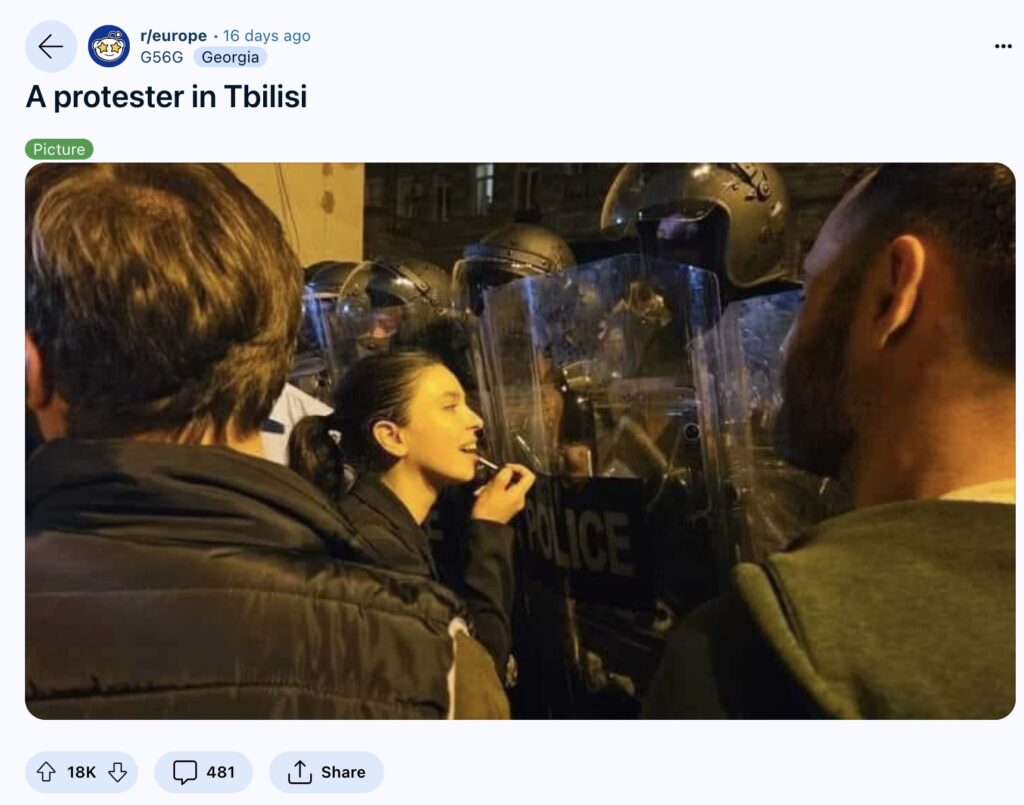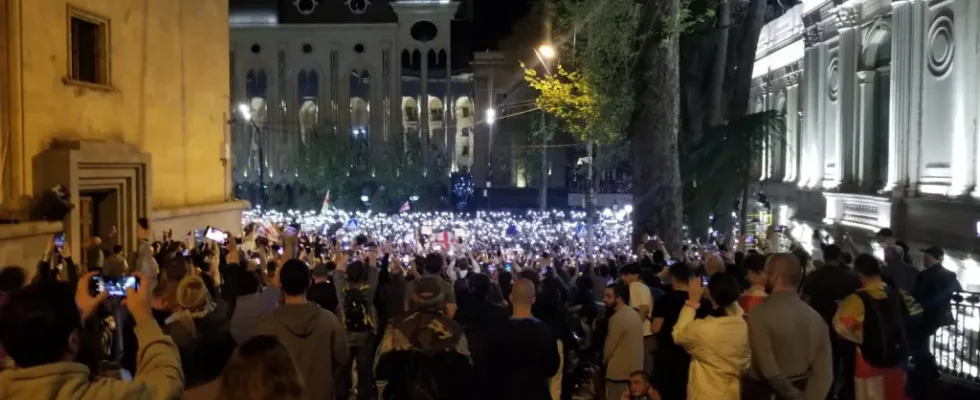Een stuk uit Georgië zelf van anarchisten in dat land, onvertaald overgenomen van Freedom
A remarkable grassroots rebellion is sweeping across Georgia against the pro-Russian regime’s blatant attempts to drag the country back under Moscow’s imperialist boot. Last night (April 28), over 106,000 Georgians poured into the streets of Tbilisi in one of the largest displays of popular resistance in the Caucasian nation’s recent history, united in their opposition to the ruling party, led by the Kremlin-aligned oligarch Bidzina Ivanishvili. Tensions are running high as the regime prepares to bus in its own astroturfed counter-protesters today, relying on administrative resources, so-called “budget employees”, and tactics of intimidation and blackmail to bolster its numbers and manufacture a façade of support.
The protest came ahead of a second parliamentary vote on the ruling Georgian Dream party’s “foreign agents” law, a page torn directly from Putin’s repressive agenda, which would force any civil society group receiving more than 20 per cent of its funding from abroad to register as a “foreign agent” or face crippling penalties. Defeated by mass protests in 2023, the law has now been resurrected to stigmatize and silence voices of dissent. This is only one among several chilling measures seeking to subjugate he country to Putin’s neo-imperialist agenda. The “offshore law”, passed by parliament, makes Georgia as a tax haven until 2028 for the repatriation of offshore assets. A brazen move to turn the country into a money laundering vehicle for Putin’s criminal elite, the law was tailor-made to benefit Ivanishvili by allowing him to move his own hidden offshore wealth into Georgia tax-free. Moreover, proposed constitutional amendments would enshrine “traditional family values” and state control over personal freedoms, criminalising LGBT+ people. These laws define marriage as the union of “one genetic man and one genetic woman”, ban same-sex couples from adopting children, criminalise gender affirmation surgery, erase non-binary gender identities, and criminalize public assembly and speech aimed at “popularising” same-sex relationships.
Open people’s assemblies
What makes these protests truly revolutionary is their decentralized, horizontal character. There are no political parties or self-appointed leaders attempting to harness the people’s anger for their own ends. Instead, the uprising is being propelled organically from below by a diverse tapestry of grassroots civil society groups, voluntary associations, affinity groups, and concerned individuals from all walks of life. Many of these groups have long differed on various issues, but they are firmly united in their rejection of the state’s authoritarian designs and its puppeteering by a foreign power.
Coordination flows through open people’s assemblies where up to 100 delegates from different groups come together to plan collective action, with multiple such gatherings happening simultaneously. The few politicians who attend these assemblies are vastly outnumbered and find their opportunism quickly checked by the vigilant activists. Georgia’s political parties are caught in a bind of their own making—expected to mount opposition as faux representatives of the people, yet swiftly shut down if they attempt to co-opt or defang the uprising.
This decentralized structure inherently challenges the efficiency of top-down control but also renders the movement beautifully resilient. The high degree of self-organization, the eschewing of hierarchical leadership, and the networked nature of the resistance immunize it against the usual pitfalls that have befallen past protests: the rise of personality cults, the hijacking by politicians, the betrayal of the movement’s base.
For three decades since winning its independence, Georgia has faced relentless efforts by Russia to drag it back into Moscow’s orbit, enduring a Russian-instigated civil war, two hybrid wars in Abkhazia and Samachablo (South Ossetia), a full-scale military invasion in 2008, and now a creeping annexation by legislative fiat. If the Kremlin-backed regime prevails, Georgia faces a devastating future: economic ruin as Western support evaporates; a suffocating police state that crushes all dissent; independent organizations, especially anarchist groups, will be liquidated (the prime minister routinely smears all protesters as “anarchists”, though sadly this is not the case). Direct Russian occupation also looms as a terrifying possibility.
But Georgians are not going down without a fight. In the streets and squares across the country, a generation that has grown up in the shadow of Russian aggression and interference is coming into its own, determined to build a Georgia free of Moscow’s shackles. Against state repression and imperialist aggression, our greatest weapons are grassroots organizing, mutual aid, and international solidarity. The battle for Georgia’s future is far from over, but the protesters are showing that the power of the people, united in a common cause and guided by the principles of autonomy and direct democracy, can challenge even the most formidable of foes.
~ Georgia Anarchist Library Collective
- De uitgelichte afbeelding is ook ontleend aan Freedom. Uit Tbilisi deze Marianne-foto die verwijst naar eerder optreden van dien aard elders… ontleend aan twitter


